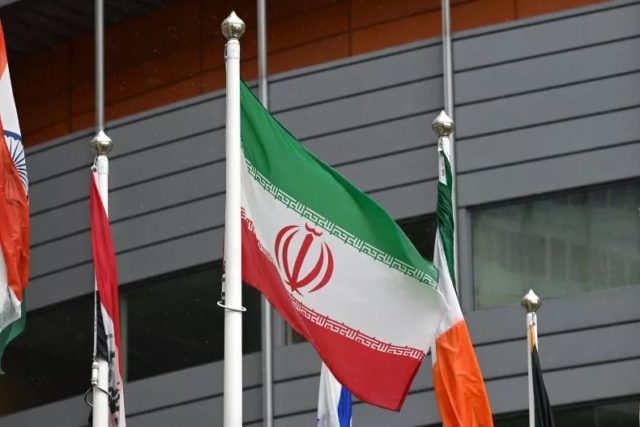Here is what happens when a country cedes control of its foreign policy. The 2015 Joint Comprehensive Plan of Action (JCPOA) was a bad deal. The Iranians cheated on the baseline, the commitment, and the execution, and then President Donald Trump walked away. Approve of any given decision or not, the president controlled the action of the United States. Now however, looking for a way to reconstruct the deal, the Biden administration has outsourced American policy.
First, President Joe Biden agreed to Iran’s demand that the U.S. not be in the negotiating room in Vienna, but be represented by intermediaries—including China and Russia.
Then, Washington gave theoretical agreement to Iran’s demand that the Iranian Revolutionary Guard Corps (IRGC) be removed from the U.S. designated terror organization list. After strong bipartisan objection in Congress—owing to the fact that the IRGC is responsible for hundreds of American military deaths—Mr. Biden appears to have told Israeli Prime Minister Naftali Bennett in May that he wouldn’t do it.
But also in May, Enrique Mora, the European Union official coordinating the Vienna talks, visited Tehran. As reported at the time, “Western diplomats are expecting Tehran to put forward potential alternative demands, giving Washington a chance to think about other concessions it could offer. The aim is to find a way around the IRGC hurdle that will let both governments sell the deal domestically.”
The latest such concession is the current American plan to give visas to Iranians who have been drafted into the IRGC, trained by it, and employed by it, “provided they satisfy relevant agency authority that the individual…poses no danger to the safety and security of the United States.” According to The Jerusalem Post, other factors taken into consideration include whether the individual had any “intent or desire to assist a terror organization or activity or had prior knowledge of targeting ‘noncombatant persons, US citizens, or US interests.'”
Sleepers, anyone?
While America grovels in Vienna, it turns a blind eye to Iran’s continuing violations of its nuclear agreements.
The International Atomic Energy Agency (IAEA) spent the past two years complaining about Iranian non-compliance. Most of its complaints went ignored in Washington. But when uranium traces found at three undeclared nuclear sites, the agency’s board had little choice but to pass a resolution. (What did you expect them to do?) The resolution “expresses profound concern” that the traces remain unexplained due to insufficient cooperation by Iran and calls on Iran to engage with the watchdog “without delay.” China and Russia, our representatives, voted alone against the resolution.
In response, Iran took down 27 monitoring cameras the IAEA had installed, subject to the JCPOA, and began installing advanced IR-6 centrifuges at its Natanz and Fordow sites, saying it would not bow to pressure. IAEA Director General Rafael Grossi warned that the move posed a “threat to the agency’s continuity of knowledge” and could deal a “fatal blow” to efforts to revive the deal. Grossi tried to go to Tehran, but was not offered a visa.
But as the IAEA appeared to be taking a harder line on Iranian violations, EU foreign policy chief Josep Borrell went to Tehran. The Iranian foreign minister welcomed him and offered Iran’s own “concession” to help Mr. Biden “sell the deal domestically,” saying Iran is seeking only economic benefits. “We hope, specifically, that the American side will this time realistically and fairly engage in committed and responsible acts towards reaching the final point of an agreement.”
Borrell didn’t mention the uranium or the cameras, or the IAEA for that matter, but held out the possibility of renewed trade between Iran and the EU if the U.S. lifts sanctions. “We will restart the discussions we [had] stopped for the last three months. And the United States and Iran will talk, not directly but with facilitation by me and my team as coordinator [of the JCPOA negotiations],” Borrell told reporters.
Qatar is now hosting indirect talks between the U.S. and Iran. Borrell opting to send his “team” to Qatar is an odd choice. The small, mostly Sunni oil producer with big aspirations, a lot of money, and a newspaper (Al Jazeera, widely quoted as authoritative in the Arab world, is government-owned and operated) has been Iran’s “respectable” face for years.
Qatar looks for ways to make itself useful to the West—conducting U.S.-Taliban negotiations, providing funds to Gaza under Israel’s supervision, hosting U.S. air and naval bases, and bankrolling prominent Americans and their institutions—including a major Washington think tank and a prominent retired American Army General.
But, at the end of the day, Qatar fears Tehran; it does not fear Washington.
Is the Biden administration so desperate for a deal that it will subordinate American interests to the EU, or the IAEA, or Qatar? Or to Iran?






